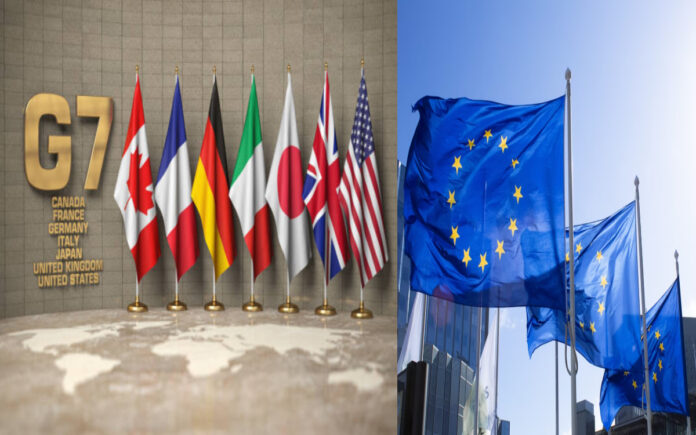New York: Amidst escalating tensions, the Group of Seven (G-7) nations and the European Union are considering imposing stricter measures against financial institutions facilitating Russia’s evasion of sanctions. According to US-based Media outlet Bloomberg, some proposals under review target third-country banks utilizing Russia’s SWIFT-like messaging system to sidestep trade restrictions.
These discussions come ahead of an upcoming G-7 summit in Italy, where leaders aim to finalize strategies for more robust enforcement of sanctions against Russia amid its ongoing conflict with Ukraine.
While the G-7 has consistently focused on blocking Russia’s access to critical technologies necessary for weaponry, Moscow has managed to bypass many of these bans by routing prohibited goods through nations like China, Turkey, the United Arab Emirates, and Central Asian countries, often employing intricate networks of intermediaries spanning various jurisdictions.
Last month, the United States and other G-7 economies announced forthcoming sanctions and export controls targeting Russia in response to its actions against Ukraine, as disclosed by a U.S. official prior to a G7 summit in Japan.
With the invasion of Ukraine entering its second year, discussions among G7 leaders in Hiroshima prioritize addressing this ongoing crisis. The U.S. has been at the forefront of imposing stringent sanctions on Russian entities, including companies, banks, and individuals, as part of a concerted effort to demonstrate unwavering support for Ukraine and exert pressure on Moscow.
Since the onset of the Ukraine conflict in February 2022, the United States, along with its allies such as the European Union and Britain, has consistently escalated sanctions and export-control measures against Russia. Washington’s sanctions targets have encompassed a wide array of entities, including Russian President Vladimir Putin, the financial sector, and oligarchs.
In recent months, Washington has intensified efforts to counter sanctions evasion, particularly focusing on dual-use items with both commercial and military applications.
Also Read | Russia Unleashes Over 100 Missiles and Drones in Overnight Assault on Ukraine
The latest U.S. sanctions package will involve significantly restricting categories of goods crucial to the battlefield, while also preventing around 70 entities from Russia and other countries from receiving U.S. exports by placing them on the U.S. Commerce Department’s blacklist.
Furthermore, the United States plans to announce approximately 300 new sanctions targeting individuals, entities, vessels, and aircraft involved in facilitating the conflict. These sanctions will extend to financial facilitators, Russia’s future energy extraction capabilities, and other entities across Europe, the Middle East, and Asia aiding the war effort.
Also Read | U.S. Doubtful It Could Assist South Korea in Nuclear Submarine Endeavors
Washington intends to expand sanctions authorities to encompass additional sectors of the Russian economy, further intensifying pressure on Moscow.
A U.S. official emphasized the importance of close alignment with the European Union and Britain to ensure a coordinated response within the G-7 framework against what was described as “Russia’s brutal actions.”



